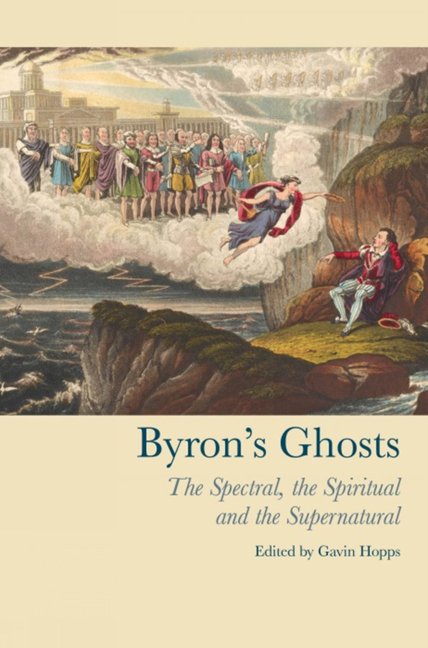Book contents
- Frontmatter
- Dedication
- Contents
- Acknowledgements
- Texts and Abbreviations
- Introduction: The Re-Enchantment of Romanticism
- Chapter 1 Determining Unknown Modes of Being: A Map of Byron's Ghosts and Spirits
- Chapter 2 Shades of Being: Byron and the Trespassing of Ontology
- Chapter 3 Byron and the Noonday Demons
- Chapter 4 Conjuration and Exorcism: Byron's Spectral Rhetoric
- Chapter 5 Byron avec Sade: Material and Spectral Violence in Childe Harold's Pilgrimage Canto IV
- Chapter 6 ‘’Twixt Life and Death’: Childe Harold's Pilgrimage, Don Juan and the Sublime
- Chapter 7 Byron, Ann Radcliffe and the Religious Implications of the Explained Supernatural in Don Juan
- Chapter 8 The Haunting of Don Juan
- Chapter 9 Being neither Here nor There: Byron and the Art of Flirtation
- Afterword: Blowing on a Dead Man's Embers: Byron's Biographical Ghosts
- Bibliography
- Notes on Contributors
- Index
Chapter 9 - Being neither Here nor There: Byron and the Art of Flirtation
- Frontmatter
- Dedication
- Contents
- Acknowledgements
- Texts and Abbreviations
- Introduction: The Re-Enchantment of Romanticism
- Chapter 1 Determining Unknown Modes of Being: A Map of Byron's Ghosts and Spirits
- Chapter 2 Shades of Being: Byron and the Trespassing of Ontology
- Chapter 3 Byron and the Noonday Demons
- Chapter 4 Conjuration and Exorcism: Byron's Spectral Rhetoric
- Chapter 5 Byron avec Sade: Material and Spectral Violence in Childe Harold's Pilgrimage Canto IV
- Chapter 6 ‘’Twixt Life and Death’: Childe Harold's Pilgrimage, Don Juan and the Sublime
- Chapter 7 Byron, Ann Radcliffe and the Religious Implications of the Explained Supernatural in Don Juan
- Chapter 8 The Haunting of Don Juan
- Chapter 9 Being neither Here nor There: Byron and the Art of Flirtation
- Afterword: Blowing on a Dead Man's Embers: Byron's Biographical Ghosts
- Bibliography
- Notes on Contributors
- Index
Summary
Byron was a flirt. Everyone from John Cam Hobhouse to Augusta Leigh commented on the poet's ability to ensnare would-be lovers with an artful combination of meaningful looks and studied aloofness. augusta wrote to Lady Byron in 1816: ‘he has been flirting [underlined twice] if not worse at the Theatre tonight – to say the truth I think flirting is ye worst for everybody talks and stares of course’. Byron's sister recognizes the performance-making and attention-getting nature of the poet's dalliances, which were an integral part of Byron's public persona. Byron makes many references to his own flirtations in his letters, making it sound as if flirting was a natural and commonplace part of his life. He refers, for example, to ‘the every-day flirtation of every-day people’ that occurred between him and Lady Adelaide Forbes, a friend of Thomas Moore. Byron writes in his typically non-committal style that he may have ‘very possibly married’ Lady Adelaide were it not for an overwhelming sense of indifference. It is this indifference, he adds, that makes him ‘so uncertain and apparently capricious. […] nothing impresses me sufficiently to fix ’. According to Thomas Medwin, Byron believed, especially after his own failed marriage, that ‘those are wisest who make no connexion to wife or mistress’.
If we take Adam Phillips's definition of flirtation as ‘the (consciously or unconsciously) calculated production of uncertainty’, we might say that not only Byron's persona, but also his poetic style was inherently flirtatious. The poet's disinclination to ‘fix ’ relationships in his personal life and flirtatiously keep things in a state of pre-matrimonial suspension was mirrored in his capricious poetic style. While Byron was involved in countless real-life flirtations – his non-committal stance apparently making him all the more desirable to potential admirers – his flirtatious poetry enticed his readers to purchase his work with ever-increasing fervour. Typically, Byron created a highly intimate poetic voice, which encourages his readers to feel that they are in a gripping personal dialogue with the author.
- Type
- Chapter
- Information
- Byron's GhostsThe Spectral, the Spiritual and the Supernatural, pp. 202 - 214Publisher: Liverpool University PressPrint publication year: 2013



